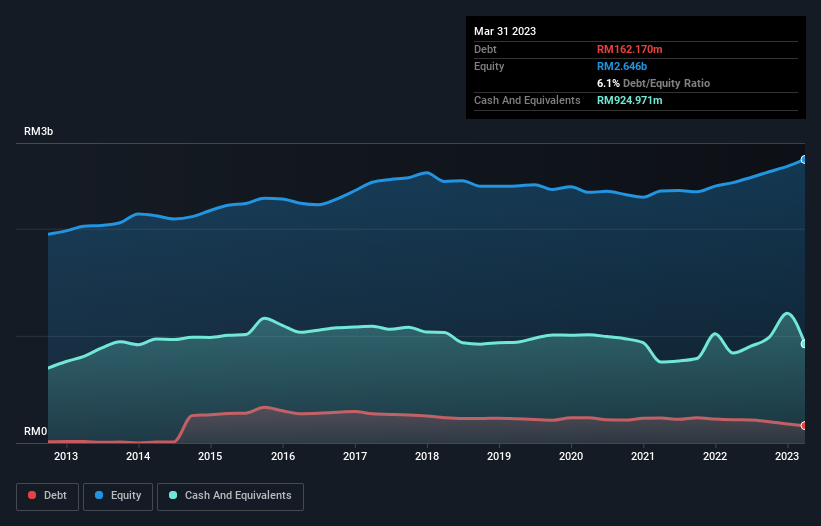Does Keck Seng (Malaysia) Berhad (KLSE:KSENG) Have A Healthy Balance Sheet?
Some say volatility, rather than debt, is the best way to think about risk as an investor, but Warren Buffett famously said that 'Volatility is far from synonymous with risk.' So it seems the smart money knows that debt - which is usually involved in bankruptcies - is a very important factor, when you assess how risky a company is. Importantly, Keck Seng (Malaysia) Berhad (KLSE:KSENG) does carry debt. But should shareholders be worried about its use of debt?
Why Does Debt Bring Risk?
Debt and other liabilities become risky for a business when it cannot easily fulfill those obligations, either with free cash flow or by raising capital at an attractive price. Ultimately, if the company can't fulfill its legal obligations to repay debt, shareholders could walk away with nothing. However, a more usual (but still expensive) situation is where a company must dilute shareholders at a cheap share price simply to get debt under control. Of course, the upside of debt is that it often represents cheap capital, especially when it replaces dilution in a company with the ability to reinvest at high rates of return. The first thing to do when considering how much debt a business uses is to look at its cash and debt together.
Check out our latest analysis for Keck Seng (Malaysia) Berhad
What Is Keck Seng (Malaysia) Berhad's Debt?
The image below, which you can click on for greater detail, shows that Keck Seng (Malaysia) Berhad had debt of RM162.2m at the end of March 2023, a reduction from RM216.9m over a year. However, it does have RM925.0m in cash offsetting this, leading to net cash of RM762.8m.

How Healthy Is Keck Seng (Malaysia) Berhad's Balance Sheet?
We can see from the most recent balance sheet that Keck Seng (Malaysia) Berhad had liabilities of RM308.1m falling due within a year, and liabilities of RM14.5m due beyond that. Offsetting this, it had RM925.0m in cash and RM86.2m in receivables that were due within 12 months. So it actually has RM688.5m more liquid assets than total liabilities.
This surplus strongly suggests that Keck Seng (Malaysia) Berhad has a rock-solid balance sheet (and the debt is of no concern whatsoever). With this in mind one could posit that its balance sheet means the company is able to handle some adversity. Succinctly put, Keck Seng (Malaysia) Berhad boasts net cash, so it's fair to say it does not have a heavy debt load!
On the other hand, Keck Seng (Malaysia) Berhad saw its EBIT drop by 3.9% in the last twelve months. If earnings continue to decline at that rate the company may have increasing difficulty managing its debt load. When analysing debt levels, the balance sheet is the obvious place to start. But it is Keck Seng (Malaysia) Berhad's earnings that will influence how the balance sheet holds up in the future. So when considering debt, it's definitely worth looking at the earnings trend. Click here for an interactive snapshot.
Finally, a business needs free cash flow to pay off debt; accounting profits just don't cut it. While Keck Seng (Malaysia) Berhad has net cash on its balance sheet, it's still worth taking a look at its ability to convert earnings before interest and tax (EBIT) to free cash flow, to help us understand how quickly it is building (or eroding) that cash balance. Over the last two years, Keck Seng (Malaysia) Berhad actually produced more free cash flow than EBIT. There's nothing better than incoming cash when it comes to staying in your lenders' good graces.
Summing Up
While we empathize with investors who find debt concerning, you should keep in mind that Keck Seng (Malaysia) Berhad has net cash of RM762.8m, as well as more liquid assets than liabilities. The cherry on top was that in converted 119% of that EBIT to free cash flow, bringing in RM237m. So is Keck Seng (Malaysia) Berhad's debt a risk? It doesn't seem so to us. There's no doubt that we learn most about debt from the balance sheet. But ultimately, every company can contain risks that exist outside of the balance sheet. To that end, you should be aware of the 2 warning signs we've spotted with Keck Seng (Malaysia) Berhad .
If, after all that, you're more interested in a fast growing company with a rock-solid balance sheet, then check out our list of net cash growth stocks without delay.
Valuation is complex, but we're here to simplify it.
Discover if Keck Seng (Malaysia) Berhad might be undervalued or overvalued with our detailed analysis, featuring fair value estimates, potential risks, dividends, insider trades, and its financial condition.
Access Free AnalysisHave feedback on this article? Concerned about the content? Get in touch with us directly. Alternatively, email editorial-team (at) simplywallst.com.
This article by Simply Wall St is general in nature. We provide commentary based on historical data and analyst forecasts only using an unbiased methodology and our articles are not intended to be financial advice. It does not constitute a recommendation to buy or sell any stock, and does not take account of your objectives, or your financial situation. We aim to bring you long-term focused analysis driven by fundamental data. Note that our analysis may not factor in the latest price-sensitive company announcements or qualitative material. Simply Wall St has no position in any stocks mentioned.
About KLSE:KSENG
Keck Seng (Malaysia) Berhad
Engages in the cultivation and sale of oil palm in Malaysia, Singapore, Hong Kong, Canada, and the United States.
Flawless balance sheet average dividend payer.
Market Insights
Community Narratives



